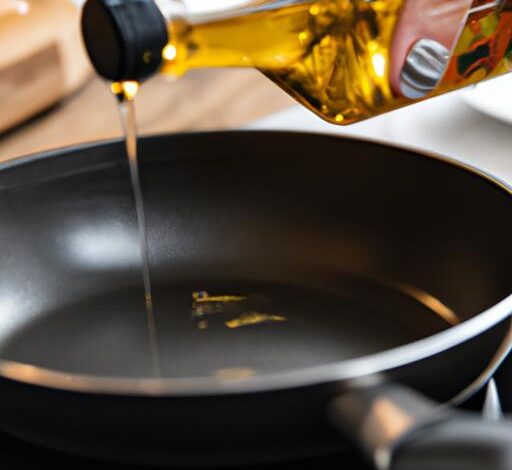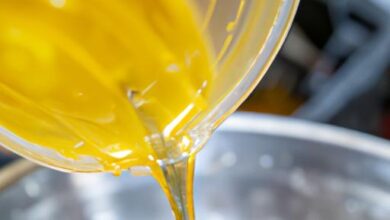Is Cooking with Olive Oil Healthy?

Introduction
When it comes to cooking, the choice of oil plays a crucial role in the overall healthiness of our meals. With so many options available, it can be overwhelming to determine which oil is the best for our well-being. However, one oil that consistently stands out for its health benefits and versatility is olive oil. In this article, we will explore the question, “is cooking with olive oil healthy?”
A. Brief Explanation of the Topic
Healthy cooking oils are essential for maintaining a balanced diet and promoting overall wellness. They provide us with essential nutrients, such as healthy fats and antioxidants, which are vital for our body’s optimal functioning. The type of oil we choose can impact our heart health, inflammation levels, and overall longevity.
B. Importance of Healthy Cooking Oils
Choosing the right cooking oil is crucial as it affects the taste, texture, and nutritional value of our meals. Healthy cooking oils are rich in monounsaturated fats, which are known to promote heart health and reduce the risk of chronic diseases. They also help in the absorption of fat-soluble vitamins, such as vitamins A, D, E, and K.
C. Introducing Olive Oil as a Popular Choice
Among the wide variety of cooking oils available, olive oil has gained significant popularity in recent years. It is a staple in Mediterranean cuisine and is known for its distinct flavor and numerous health benefits. Olive oil is derived from pressing olives, resulting in a natural oil that retains its nutritional value.
Olive oil is not only a flavorful addition to dishes but also offers an array of health benefits. Its high content of monounsaturated fats, specifically oleic acid, has been linked to reducing the risk of heart diseases and improving overall cardiovascular health. Additionally, olive oil contains antioxidants that help fight inflammation and protect against oxidative stress.
In the following sections, we will delve deeper into the nutritional composition of olive oil, explore its health benefits, discuss the best practices of cooking with olive oil, debunk common myths, and ultimately answer the question, “Is cooking with olive oil healthy?” So, let’s embark on this culinary journey together and uncover the wonders of incorporating olive oil into our everyday cooking.
Understanding Olive Oil
A. Definition and Types of Olive Oil
Olive oil, often called “liquid gold,” is a culinary treasure derived from the fruit of olive trees. It has been cherished for centuries for its rich flavor, versatility, and health benefits. There are several types of olive oil, each with its own characteristics and uses.
-
Extra Virgin Olive Oil (EVOO): This is the highest grade of olive oil, obtained through the cold-pressing method without the use of chemicals or excessive heat. EVOO retains the natural flavors and aromas of the olives, making it ideal for drizzling over salads or using as a finishing oil.
-
Virgin Olive Oil: Slightly lower in quality than EVOO, virgin olive oil is also obtained through mechanical means. However, it may have slightly higher acidity levels and a milder flavor compared to extra virgin olive oil.
-
Refined Olive Oil: Refined olive oil is produced by refining virgin olive oil, usually through a process involving filtering and heat. It has a more neutral flavor and a higher smoke point, making it suitable for high-heat cooking methods like frying.
-
Pure Olive Oil: This blend consists of both refined and virgin olive oils. It undergoes refining processes to remove impurities and enhance stability. Pure olive oil has a mild flavor and can be used for various cooking purposes.
-
Olive Pomace Oil: Extracted from the pulp and pits of olives after the first press, olive pomace oil undergoes a refining process using solvents and heat. It is a more affordable option but lacks the flavor and health benefits of extra virgin olive oil.
B. Nutritional Composition of Olive Oil
Olive oil is not only known for its delightful taste but also its impressive nutritional profile. It is primarily composed of monounsaturated fats, which are considered heart-healthy fats that can help lower bad cholesterol levels. A typical serving of olive oil (1 tablespoon) contains approximately:
- Calories: 120
- Total Fat: 14 grams
- Saturated Fat: 2 grams
- Monounsaturated Fat: 10 grams
- Polyunsaturated Fat: 2 grams
Olive oil also contains essential vitamins and antioxidants, including vitamin E and phenolic compounds, which have been associated with various health benefits.
C. Differentiating Between Refined and Extra Virgin Olive Oil
One key factor to consider when choosing olive oil for cooking is the smoke point, which is the temperature at which the oil starts to smoke and break down. Extra virgin olive oil has a lower smoke point compared to refined olive oil, making it more suitable for low to medium-heat cooking methods such as sautéing and roasting. Refined olive oil, with its higher smoke point, can withstand higher temperatures and is better suited for deep frying and high-heat cooking.
Understanding the different types of olive oil and their nutritional composition allows us to make informed decisions when selecting the appropriate oil for our culinary needs. In the next section, we will explore the numerous health benefits associated with cooking with olive oil.
Health Benefits of Olive Oil
A. High Content of Monounsaturated Fats
One of the key reasons why cooking with olive oil is considered healthy is its high content of monounsaturated fats. Unlike saturated and trans fats, monounsaturated fats have been found to have positive effects on our health. Olive oil is primarily composed of oleic acid, a monounsaturated fat that is known to promote heart health by reducing bad cholesterol levels (LDL) while increasing good cholesterol levels (HDL).
B. Role in Reducing the Risk of Heart Diseases
Heart diseases are a leading cause of mortality worldwide, making it crucial to take preventive measures. Olive oil has been widely studied for its potential in reducing the risk of heart diseases. The monounsaturated fats in olive oil help lower blood pressure, improve blood vessel function, and reduce inflammation, all of which contribute to better heart health. By incorporating olive oil into our cooking, we can make a positive impact on our cardiovascular well-being.
C. Potential Anti-inflammatory Properties
Chronic inflammation has been linked to various diseases, including heart diseases, diabetes, and certain cancers. Olive oil contains natural compounds, such as polyphenols and oleocanthal, which possess anti-inflammatory properties. These compounds have been shown to decrease the production of inflammatory markers in the body and potentially lower the risk of chronic inflammatory diseases.
D. Antioxidant Effects and Their Impact on Overall Health
Antioxidants play a crucial role in protecting our cells from damage caused by free radicals. Olive oil is rich in antioxidants, such as vitamin E and phenolic compounds, which help neutralize free radicals and reduce oxidative stress in the body. This antioxidant activity not only supports overall health but also contributes to the prevention of age-related diseases, such as Alzheimer’s and certain types of cancer.
By embracing olive oil as a cooking staple, we can reap these health benefits and enhance the nutritional value of our meals. The next section will explore the best practices of cooking with olive oil, ensuring that we maximize its potential while preserving its healthful properties. So, let’s dive into the world of culinary possibilities with olive oil as our trusted companion.
Cooking with Olive Oil
A. Smoke Point of Olive Oil
One crucial factor to consider when cooking with olive oil is its smoke point. The smoke point refers to the temperature at which an oil starts to break down and produce smoke. Using an oil beyond its smoke point can lead to the formation of harmful compounds and a pungent taste in the food.
Extra virgin olive oil, which is unrefined and extracted through cold pressing, has a lower smoke point compared to refined olive oil. It is best suited for low to medium heat cooking, such as sautéing and light frying. Refined olive oil, on the other hand, has a higher smoke point and is more suitable for high-heat cooking methods like roasting and deep frying.
B. Importance of Using the Correct Heat
To preserve the nutritional benefits of olive oil and prevent the formation of harmful substances, it is essential to use the appropriate heat while cooking. Heating olive oil beyond its smoke point can degrade its quality and reduce its health benefits.
Maintaining a moderate heat ensures that the oil retains its natural antioxidants and healthy fats, providing you with the maximum health benefits. It is recommended to keep the heat at a level where the oil shimmers but does not produce smoke.
C. Suitable Cooking Methods for Olive Oil
Olive oil is incredibly versatile and can be used in various cooking methods. It adds a delightful flavor to salads, marinades, dressings, and dips. When it comes to cooking, olive oil is excellent for sautéing vegetables, stir-frying, and lightly frying foods.
Additionally, olive oil can be used for baking, particularly in recipes that call for a mild and fruity taste. It can replace other oils or butter in a 1:1 ratio. However, keep in mind that the flavor of olive oil may come through in certain baked goods, so it is best utilized in recipes where its taste complements the other ingredients.
D. Retention of Nutrients during Cooking
One of the remarkable qualities of olive oil is its ability to retain its nutritional value even during cooking. While heat can cause some nutrient loss in foods, olive oil’s robust composition helps preserve its beneficial properties. The monounsaturated fats and antioxidants present in olive oil remain relatively stable when exposed to moderate heat.
To optimize the nutrient retention, it is recommended to avoid overheating olive oil and not to reuse it excessively. Using fresh olive oil for each cooking session ensures you receive the maximum nutritional benefits it has to offer.
Now that we understand the importance of proper cooking techniques with olive oil and how to preserve its nutrients, let’s address some common myths surrounding cooking with olive oil in the next section.
Common Myths about Cooking with Olive Oil
A. Myth: Heating olive oil makes it unhealthy
There is a common misconception that heating olive oil turns it into an unhealthy option for cooking. This myth suggests that when olive oil reaches its smoke point, it breaks down and produces harmful compounds that can be detrimental to our health. However, this belief is not entirely accurate.
While it is true that heating oil beyond its smoke point can lead to the formation of harmful substances, the smoke point of olive oil is generally high enough to withstand most cooking temperatures. Extra virgin olive oil, in particular, has a higher smoke point than many other cooking oils, making it suitable for a wide range of cooking methods, including sautéing, baking, and even frying.
B. Myth: Olive oil loses its nutritional value when heated
Another prevalent myth surrounding olive oil is that it loses its nutritional value when exposed to heat. Some believe that the beneficial antioxidants and healthy fats in olive oil degrade during the cooking process, rendering it less nutritious. However, this notion is not entirely accurate either.
While it is true that cooking can cause some loss of nutrients in any food, the impact on olive oil is minimal. In fact, studies have shown that certain antioxidants in olive oil, such as phenolic compounds, remain stable even at high temperatures. Additionally, the monounsaturated fats in olive oil are relatively stable and do not undergo significant degradation when heated.
C. Debunking Common Misconceptions about Olive Oil
It is important to debunk these misconceptions about olive oil to fully understand its benefits and make informed choices in our cooking practices. Olive oil is a versatile and healthy option that can be safely used for various cooking methods. By choosing a high-quality olive oil and using it correctly, we can enjoy its nutritional benefits without compromising our health.
To ensure the quality and health benefits of olive oil, it is advisable to opt for extra virgin olive oil, which undergoes minimal processing and retains the highest levels of antioxidants and healthy fats. Additionally, using moderate heat and not overheating the oil can help retain its nutritional value. By understanding and debunking these myths, we can confidently incorporate olive oil into our cooking routine and reap its numerous health benefits.
Conclusion
After exploring the various aspects of cooking with olive oil, it is evident that this versatile oil is indeed a healthy choice for your culinary endeavors. Olive oil offers a plethora of health benefits, including its high content of monounsaturated fats, which promote heart health and reduce the risk of cardiovascular diseases. Its antioxidant properties help combat inflammation and protect against oxidative stress, contributing to overall well-being.
While concerns about the smoke point of olive oil have circulated, it is important to note that when used correctly, olive oil can withstand moderate heat without compromising its nutritional value. By using the appropriate cooking methods and maintaining the right temperature, you can enjoy the benefits of olive oil while preserving its flavors and nutrients.
Now that you have a better understanding of olive oil’s nutritional composition, health benefits, and cooking techniques, it’s time to embrace this Mediterranean gem in your own kitchen. Whether you’re drizzling it over salads, sautéing vegetables, or using it as a base for marinades, olive oil adds a delightful flavor profile and a dose of healthiness to your meals.
So, the next time you ask yourself, “Is cooking with olive oil healthy?” remember that the answer is a resounding yes. Incorporate olive oil into your cooking routine and enjoy the myriad of health benefits it brings. Your taste buds and your body will thank you.
Now, armed with knowledge about the wonders of cooking with olive oil, it’s time to take your culinary skills to new heights and savor the goodness that this exceptional oil offers.
Conclusion: So above is the Is Cooking with Olive Oil Healthy? article. Hopefully with this article you can help you in life, always follow and read our good articles on the website: cook.mahjong-gratuit.net




